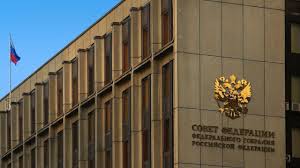The Federation Council is the upper house of the Federal Assembly of Russia. It represents the interests of Russia’s federal subjects, which include republics, krais (territories), oblasts (regions), autonomous okrugs, and federal cities.
Key Roles and Functions:
- Representation of Federal Subjects: Each federal subject is represented by two members in the Federation Council, ensuring regional interests are considered in federal legislation.
- Legislative Power: The Federation Council shares legislative power with the State Duma. It reviews and approves federal laws, including constitutional amendments.
- Approval of Presidential Appointments: The Federation Council approves the President’s appointments of high-ranking officials, such as the Prime Minister, judges of the Supreme Court, and prosecutors.
- Declaration of Martial Law: The Federation Council has the authority to declare martial law and a state of emergency in specific regions.
- International Relations: The Federation Council participates in international parliamentary cooperation, fostering diplomatic relations with other countries.
Composition and Election
The Federation Council consists of 178 members, with two representatives from each federal subject. These representatives are typically senior officials from the regional governments, such as governors or members of regional legislatures. They are appointed by the regional authorities and serve for the duration of their term as regional officials.
Current Political Landscape
In recent years, the Federation Council has been dominated by members of the United Russia party, reflecting the party’s dominance in Russian politics. While it is expected to represent the interests of the regions, the Council’s independence is often questioned.
Challenges and Future Outlook
The Federation Council faces several challenges, including:
- Lack of Independence: Critics argue that the Council is often used as a rubber stamp for the executive branch, lacking the autonomy to effectively represent regional interests.
- Regional Disparities: Russia’s vast territory and diverse regions present challenges in ensuring equitable representation and addressing regional disparities.
- Evolving Federalism: The balance of power between the federal government and regional authorities is a complex and evolving issue.
Despite these challenges, the Federation Council remains an important institution in the Russian political system. Its role in representing regional interests and shaping federal legislation is crucial for the country’s political stability and development.

Leave a Reply